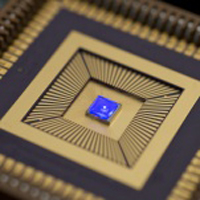
| Home | About Us | Contribute | Bookstore | Advertising | Subscribe for Free NOW! |
| News Archive | Features | Events | Recruitment | Directory |
News
14 July 2010
Strathclyde spins off mLED for microLED light sources
Strathclyde University has secured a spin-out deal to form the firm mLED Ltd, focused on next-generation light source technology that could open up opportunities in multi-billion dollar applications including neuroscience, microscopy and communications, it is reckoned.
Braveheart Investment Group led the £150,000 funding round, investing via both the Strathclyde Innovation Fund (SIF) and the Alpha EIS Fund. Scottish Enterprise's Scottish Seed Fund also participated.
 mLED specializes in micro light-emitting diodes (microLEDs), which consist of dense arrays of thousands of miniature light emitters in a compact, integrated package. Unlike other micro-display technologies, microLEDs are pattern programmable and do not require a plethora of external components, such as optics and switching matrices, to modulate the light pattern, making them more compact and efficient, says Strathclyde.
mLED specializes in micro light-emitting diodes (microLEDs), which consist of dense arrays of thousands of miniature light emitters in a compact, integrated package. Unlike other micro-display technologies, microLEDs are pattern programmable and do not require a plethora of external components, such as optics and switching matrices, to modulate the light pattern, making them more compact and efficient, says Strathclyde.
“There are only a few companies in the world which have recognised the opportunity and demonstrated capability in this area,” reckons mLED’s chief executive Dr Jim Bonar. “We are producing a platform technology that is compact, robust, reliable and versatile,” he adds.
“MicroLEDs have particularly strong potential for evolving life science markets such as neuroscience and for the emerging telecoms market of pico projectors, as well as for printing, microscopy and next-generation general lighting arrangements,” Bonar says. “The power density, versatility and compactness of microLEDs makes them ideally suited for these applications,” he claims.
Each of the microLEDs has enough light output to affect other materials, allowing actions such as the active illumination and stimulation of cells. They also have a switching speed fast enough for use in communications or in fluorescence lifetime imaging, which can be used to study cells. “We have demonstrator kits available for sale so that developers can see if the micro-LEDs fit with their own innovative applications — we aim to be delivering to customers very soon,” says Bonar.
“The university, and its Institute of Photonics, have been extremely supportive throughout the process of setting up mLED,” Bonar states. “The university’s Department of Research and Knowledge Exchange Services has been hugely helpful in enabling us to realise our ambitions so far.”
The technology has been developed at Strathclyde’s Institute of Photonics by a research team led by its director of research professor Martin Dawson, associate director Dr Erdan Gu and research technologist Dr Gareth Valentine, all of whom will act as consultants to mLED.
Major funding was also obtained from the Scottish Enterprise Proof of Concept Fund and from the UK Engineering and Physical Sciences Research Council (EPSRC). Bonar was initially contracted by the university as chief executive designate through the Technology Talent Initiative, funded partially by the European Regional Development Fund.
“He has a wealth of experience in photonics start-ups, and we believe the company has the potential to be a market leader in the photonics sector, which offers exciting research and business opportunities worldwide,” says Institute of Photonics' business development manager Simon Andrews.
“Considerable research investment was made by public sources while we continued to develop the equipment,” says Andrews. “We look forward to working with mLED in bringing this advancing technology to rapidly expanding marketplaces.”
The spin-out follows the recent launch of SU2P, a Strathclyde-led partnership between academic institutions in Scotland and California, capitalizing on the academic and commercial strengths of the photonics sector. SU2P is funded by EPSRC, through the RCUK Science Bridges awards, the Scottish Funding Council and Scottish Enterprise.
Strathclyde was recently rated as one of the UK's top 10 universities to work with by the business community. The university has so far formed more than 50 spin-out companies.
![]() Search: LEDs
Search: LEDs
Visit: www.strath.ac.uk